 The summer of 2011 is over, a new school year has started, everyone has finally unpacked their camp bags, and now the wait for the summer of 2012 begins. Ten months isn’t really that long. Every year we manage to wait it out. But when it’s September and the fun times we had this past summer are still fresh in our minds, it seems like an eternity; and, inevitably, we all feel a little bit (or a lot!) camp sick. We all know the feeling. Some of us find ourselves singing camp songs or have the urge to tie-dye something…maybe even set our ring tones to the camp bell, or just sit around with camp friends re-living all of the memories from the summer. Saying goodbye to another summer in our own way is a rite that we go through every fall. We not only say goodbye to our camp friends, but our counselors, and upper campers. But on the upside of goodbye is hello. Hello to all of our new friends who will join us for the first time next summer. Hello to the challenge and excitement of planning a new summer that’s even better than last. Hello to good times that turn into new memories. Hello to a new group of campers. Hello to the new counselors and staff members who choose to make camp their summer home next year. Hello, everyone. We can’t wait to see you in the summer of 2012!
The summer of 2011 is over, a new school year has started, everyone has finally unpacked their camp bags, and now the wait for the summer of 2012 begins. Ten months isn’t really that long. Every year we manage to wait it out. But when it’s September and the fun times we had this past summer are still fresh in our minds, it seems like an eternity; and, inevitably, we all feel a little bit (or a lot!) camp sick. We all know the feeling. Some of us find ourselves singing camp songs or have the urge to tie-dye something…maybe even set our ring tones to the camp bell, or just sit around with camp friends re-living all of the memories from the summer. Saying goodbye to another summer in our own way is a rite that we go through every fall. We not only say goodbye to our camp friends, but our counselors, and upper campers. But on the upside of goodbye is hello. Hello to all of our new friends who will join us for the first time next summer. Hello to the challenge and excitement of planning a new summer that’s even better than last. Hello to good times that turn into new memories. Hello to a new group of campers. Hello to the new counselors and staff members who choose to make camp their summer home next year. Hello, everyone. We can’t wait to see you in the summer of 2012!
Tag: summer camp
Come Rain or Come Shine…
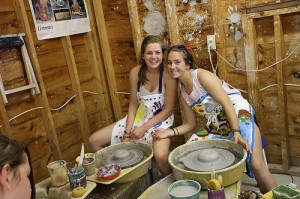 Do you ever wonder what happens at camp when it rains? We assure you, it’s nothing like those scenes in movies that depict bummed out campers forced to spend entire days in their cabins or bunks . Typically, it doesn’t rain all that often in the northeast during the summer and, whenever possible, activities proceed as planned. We never let a few sprinkles get in the way of our regular activities. But on those rare days when there is just no way around it, we’re ready!
Do you ever wonder what happens at camp when it rains? We assure you, it’s nothing like those scenes in movies that depict bummed out campers forced to spend entire days in their cabins or bunks . Typically, it doesn’t rain all that often in the northeast during the summer and, whenever possible, activities proceed as planned. We never let a few sprinkles get in the way of our regular activities. But on those rare days when there is just no way around it, we’re ready!
When we wake up to a morning that makes outdoor activities unrealistic, we swing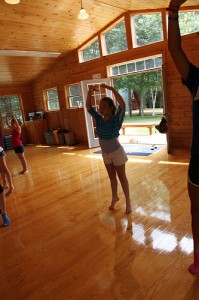 into action by implementing alternative programs. Camp is just as fun and active when it’s a little bit wet outside as it is when the sun is shining. By utilizing our indoor facilities, we’re able to keep the action going by combining our regular programs that are already completely or partially indoors, like gymnastics and arts and crafts, with special activities, like games, trivia contests, or sing-a-longs. Sometimes, we simply move some of the things we normally do outside to an indoor location. Ga-ga, basketball, and soccer, for instance, all adapt well to indoor locations. By making just a few minor adjustments, we’re able to make sure that everyday at camp is full of good times and memories for our campers, not just those days when the sun shines.
into action by implementing alternative programs. Camp is just as fun and active when it’s a little bit wet outside as it is when the sun is shining. By utilizing our indoor facilities, we’re able to keep the action going by combining our regular programs that are already completely or partially indoors, like gymnastics and arts and crafts, with special activities, like games, trivia contests, or sing-a-longs. Sometimes, we simply move some of the things we normally do outside to an indoor location. Ga-ga, basketball, and soccer, for instance, all adapt well to indoor locations. By making just a few minor adjustments, we’re able to make sure that everyday at camp is full of good times and memories for our campers, not just those days when the sun shines.
A Look Behind the Scenes
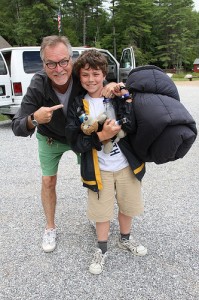 Every day, we rely on a several teams of individuals to make camp happen. Everyone knows about camp counselors, the people on the front lines, but not everyone is aware of the people who work behind the scenes to make sure everything runs smoothly. Running a summer camp really is more than showing up in June ready to welcome campers and have fun. There are a myriad of staff members who perform the often thankless job of working “behind the scenes” at camp. They are a very diverse group of individuals. Some of them answer the phone when you call the camp. Others schedule daily activities, arrange transportation, or cook the food. Still, others take care of your children when they’re not feeling well, or look into your concerns about their daily lives at camp.
Every day, we rely on a several teams of individuals to make camp happen. Everyone knows about camp counselors, the people on the front lines, but not everyone is aware of the people who work behind the scenes to make sure everything runs smoothly. Running a summer camp really is more than showing up in June ready to welcome campers and have fun. There are a myriad of staff members who perform the often thankless job of working “behind the scenes” at camp. They are a very diverse group of individuals. Some of them answer the phone when you call the camp. Others schedule daily activities, arrange transportation, or cook the food. Still, others take care of your children when they’re not feeling well, or look into your concerns about their daily lives at camp.
The fact of the matter is that summer camps require individuals of many interests and talents to operate successfully, and the measure of a good summer relies on the abilities and passions of these individuals. They often work long hours, from sunrise until the wee hours of the morning simply because they love camp. If you ask any one of them, they’ll tell you that they do what they do because, in the end, it contributes to a successful summer for campers and their parents. They also might be a little coy in admitting that it’s just plain fun for them.
Furthermore, these people are so good at their jobs that we don’t even adequately know how to thank them. They work with  passion and without regard to anything but making sure our campers and their parents have the best possible experience at our camps. It truly is a thankless job , in many ways, to work behind the scenes at an American summer camp. But we are thankful!
passion and without regard to anything but making sure our campers and their parents have the best possible experience at our camps. It truly is a thankless job , in many ways, to work behind the scenes at an American summer camp. But we are thankful!
The Importance of Being Creative
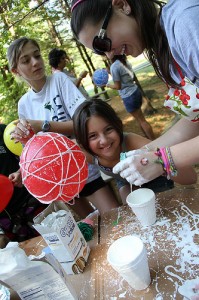 Arts and Crafts at summer camp is more than just stringing together a few beads to make a bracelet or gluing some spray painted macaroni to a cardboard picture frame. It’s a program that gives campers the opportunity to explore their creative interests in several different types of art by offering a diverse array of age appropriate projects. Of course there are the traditional projects that are just plain fun, like paper mache and tie-dying. However, many summer camps also offer campers the opportunity to try things that are not only artistic but could be useful skills or even careers, such as metal work, jewelry making, calligraphy, cartooning, or soap and candle making. Just like sports programs at camp, many campers have discovered a passion in their summer camp’s Arts and Crafts programs that they later pursued further.
Arts and Crafts at summer camp is more than just stringing together a few beads to make a bracelet or gluing some spray painted macaroni to a cardboard picture frame. It’s a program that gives campers the opportunity to explore their creative interests in several different types of art by offering a diverse array of age appropriate projects. Of course there are the traditional projects that are just plain fun, like paper mache and tie-dying. However, many summer camps also offer campers the opportunity to try things that are not only artistic but could be useful skills or even careers, such as metal work, jewelry making, calligraphy, cartooning, or soap and candle making. Just like sports programs at camp, many campers have discovered a passion in their summer camp’s Arts and Crafts programs that they later pursued further.
Another way in which summer camp Arts & Crafts programs benefit campers is by providing a 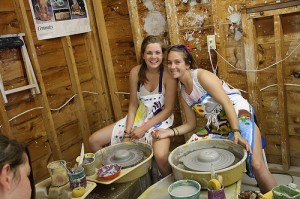 creative outlet for children who are being given fewer chances to explore the arts in their school programs. Ashfaq Ishaq, PhD, argues that without being given the appropriate opportunity to explore their creative sides, children will not learn how to combine creativity with acquired knowledge to reach their full potential. Art encourages spontaneity and exploration, two things that allow us, as people, to be innovative and prolific in our thinking. Creativity also refines problem solving skills by helping us understand how to think “outside the box” when traditional solutions aren’t practical. All three qualities are considered crucial to success in a child’s education as well as their adulthood careers. Summer camp Arts & Crafts programs also give campers the opportunity to try some projects that might not be available in traditional school art programs, such as throwing clay on a pottery wheel.
creative outlet for children who are being given fewer chances to explore the arts in their school programs. Ashfaq Ishaq, PhD, argues that without being given the appropriate opportunity to explore their creative sides, children will not learn how to combine creativity with acquired knowledge to reach their full potential. Art encourages spontaneity and exploration, two things that allow us, as people, to be innovative and prolific in our thinking. Creativity also refines problem solving skills by helping us understand how to think “outside the box” when traditional solutions aren’t practical. All three qualities are considered crucial to success in a child’s education as well as their adulthood careers. Summer camp Arts & Crafts programs also give campers the opportunity to try some projects that might not be available in traditional school art programs, such as throwing clay on a pottery wheel.
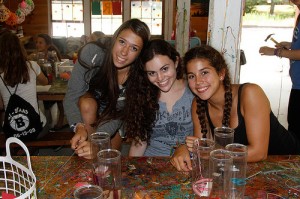 For many campers, summer camp has become a way of maintaining tradition in environments that are ever changing. Faced with a fast paced, changing world in the winter, children can still depend on summer as a way to fall back on activities and hobbies that may not be greatly valued in conventional schools anymore but are useful and bring satisfaction. Arts and Crafts may be a dying art within American school systems. But it’s thriving within American summer camps.
For many campers, summer camp has become a way of maintaining tradition in environments that are ever changing. Faced with a fast paced, changing world in the winter, children can still depend on summer as a way to fall back on activities and hobbies that may not be greatly valued in conventional schools anymore but are useful and bring satisfaction. Arts and Crafts may be a dying art within American school systems. But it’s thriving within American summer camps.
“Sports Camp” Isn’t Just a One Sport Term
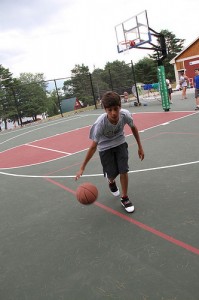 It’s no secret that summer camps offer campers the opportunity to sample many different sports, but what may not be evident is why this may be preferable to sending children to a camp at which the focus is exclusively on one sport. Dr. Jared Wood, a sports psychologist, believes children should be encouraged to try many different sports in order to find their favorites. He warns that focusing on one sport too early in youth often “unnecessarily limits a child’s interest and skill development.”
It’s no secret that summer camps offer campers the opportunity to sample many different sports, but what may not be evident is why this may be preferable to sending children to a camp at which the focus is exclusively on one sport. Dr. Jared Wood, a sports psychologist, believes children should be encouraged to try many different sports in order to find their favorites. He warns that focusing on one sport too early in youth often “unnecessarily limits a child’s interest and skill development.”
Many child development experts recommend that children be given the opportunity to try out a sport before committing to it because it’s important for them to develop their self esteem prior to joining a team and engaging in intense training. When children enter a sport with confidence, they’re more likely feel that they can do well and, therefore, strive to do well. Many summer camp sports programs subscribe to this recommended combination of skill instruction and giving children the opportunity to use those new skills on the field or court. Summer camps also emphasize skill development over winning or losing. Campers learn sports skills in a supportive atmosphere and are taught by specialists who are proficient in their respective sports Many summer camp sports programs are headed by college or high school coaches who lead counselors who played at the high school and college level. This type of approach permits campers to try out various positions and get comfortable with the rules and general flow of a sport without feeling pressured to do well by overly zealous parents and coaches.
Another benefit of summer camp sports programs is that they offer a healthy mix of team and individual sports. Child experts 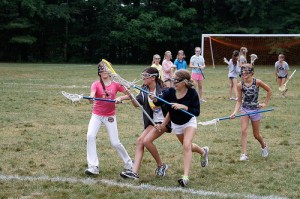 point out that some children prefer and perform at their best as part of a team while others are happier and better off playing individual sports. By being able to simultaneously sample tennis and lacrosse, for instance, campers can get a feel for which one leaves them feeling the most motivated to further develop their skills while still being able to have a healthy appreciation for the other.
point out that some children prefer and perform at their best as part of a team while others are happier and better off playing individual sports. By being able to simultaneously sample tennis and lacrosse, for instance, campers can get a feel for which one leaves them feeling the most motivated to further develop their skills while still being able to have a healthy appreciation for the other.
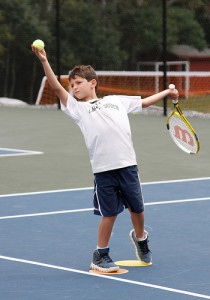 The variety offered at summer camp also gives campers the opportunity to try sports to which they may never have been exposed or would not otherwise have the opportunity to try. Many a camper has tried a sport for the first time at summer camp and then gone on to play on a travel team, high school team, or even a college team. Sports psychologist and author, Richard Ginsburg, Ph.D., suggests that children should be at least “12 or 13” before being encouraged to commit to one sport. Dr. Wood agrees, “It’s pretty clear that early specialization is much more likely to lead to burnout than it is to a scholarship or Olympic medal.”
The variety offered at summer camp also gives campers the opportunity to try sports to which they may never have been exposed or would not otherwise have the opportunity to try. Many a camper has tried a sport for the first time at summer camp and then gone on to play on a travel team, high school team, or even a college team. Sports psychologist and author, Richard Ginsburg, Ph.D., suggests that children should be at least “12 or 13” before being encouraged to commit to one sport. Dr. Wood agrees, “It’s pretty clear that early specialization is much more likely to lead to burnout than it is to a scholarship or Olympic medal.”
So when you’re determining which type of summer camp is right for your child. Consider the benefit of a summer camp that offers a diverse array of sports that will permit your child to sample a variety of choices.
A Special Place for Boys and Girls
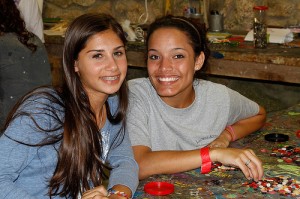 For older campers, one of the most profound and lasting advantages of camp is the opportunity they have to focus on being boys and girls. Many summer camps also strengthen the safety of the camp setting by offering exclusive programs that help teenage campers gain a better understanding about how to best grasp the transition from being girls to being women and from being boys to being men. Such programs provide non threatening forums for teenage girls and boys to address sensitive issues and topics as well as help them prepare for their later teen years as they near college and adulthood. These programs also have their own rites and traditions that serve as progress points for individuals as well as groups and as the basis for the point at which camp friends become a lifelong support network.
For older campers, one of the most profound and lasting advantages of camp is the opportunity they have to focus on being boys and girls. Many summer camps also strengthen the safety of the camp setting by offering exclusive programs that help teenage campers gain a better understanding about how to best grasp the transition from being girls to being women and from being boys to being men. Such programs provide non threatening forums for teenage girls and boys to address sensitive issues and topics as well as help them prepare for their later teen years as they near college and adulthood. These programs also have their own rites and traditions that serve as progress points for individuals as well as groups and as the basis for the point at which camp friends become a lifelong support network.
Many camps, even co-ed ones, also operate separate programs for boys and girls regardless of age. They have their respective sides 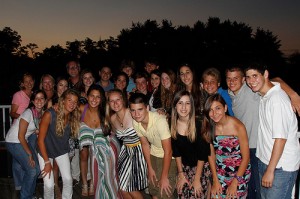 of camp, their respective program areas, and their respective activities. However, they come together for meals and many evening camp activities. Many believe this approach is a bit part of why children are afraid to relax and even be silly while at camp. Being with children of the same gender frees them of stereotypes that may be placed on them elsewhere. Spending exclusive time with other girls or boys creates a non threatening environment, particularly for adolescents and early teens already going through awkward changes as they begin to maneuver the sometimes tumultuous teen years. Girls can get down and dirty in an intense game of flag football and boys don’t feel the need to look over their shoulders while bouncing around in the camp’s gymnastics area or putting together some choreographed moves in the dance studio because it’s all just a part of camp.
of camp, their respective program areas, and their respective activities. However, they come together for meals and many evening camp activities. Many believe this approach is a bit part of why children are afraid to relax and even be silly while at camp. Being with children of the same gender frees them of stereotypes that may be placed on them elsewhere. Spending exclusive time with other girls or boys creates a non threatening environment, particularly for adolescents and early teens already going through awkward changes as they begin to maneuver the sometimes tumultuous teen years. Girls can get down and dirty in an intense game of flag football and boys don’t feel the need to look over their shoulders while bouncing around in the camp’s gymnastics area or putting together some choreographed moves in the dance studio because it’s all just a part of camp.
Sing, Sing a Song
 There is something about singing that brings people together. Perhaps that’s why singing (and music in general) is such an important part of camp. The silly or sometimes sentimental words of a “camp song” can set a mood, evoke a feeling, and create atmosphere. Music is a universal language that everyone understands. Perhaps this is why so many American summer camps open and close their summers with sing-alongs. Sing-alongs are fantastic ways to say both “we’re together again” and “until next time.”
There is something about singing that brings people together. Perhaps that’s why singing (and music in general) is such an important part of camp. The silly or sometimes sentimental words of a “camp song” can set a mood, evoke a feeling, and create atmosphere. Music is a universal language that everyone understands. Perhaps this is why so many American summer camps open and close their summers with sing-alongs. Sing-alongs are fantastic ways to say both “we’re together again” and “until next time.”
Ask campers to name some of their most favorite moments of summer camp and,  most assuredly, they’ll name more than one that involves singing in some way…that first exciting night of camp, campfires, zany and often spontaneous dining room rituals, fun times with fellow campers and counselors inside the bunk, and saying goodbye at the end of the summer. More importantly, ask any current or former camper to sing his camp alma mater and he’ll do it as if it’s second nature. The words of a camp’s alma mater are magical—a way to instantly transport one back to camp and those summers filled with fun and friends.
most assuredly, they’ll name more than one that involves singing in some way…that first exciting night of camp, campfires, zany and often spontaneous dining room rituals, fun times with fellow campers and counselors inside the bunk, and saying goodbye at the end of the summer. More importantly, ask any current or former camper to sing his camp alma mater and he’ll do it as if it’s second nature. The words of a camp’s alma mater are magical—a way to instantly transport one back to camp and those summers filled with fun and friends.
Many parents say that their children even sing camp songs constantly throughout the winter as a way of remembering their time at camp. Some of them even admit that they can’t resist the temptation to join in.
Crazy Days and Whacky Nights
 Parents, do you ever log onto your computer to check out the camp photos for the day, see your child painted in blue from head to toe or maybe wearing a crazy wig and big nerdy glasses and wonder, ‘What in the world?’ The answer probably has something to do with your summer camp’s special events and evening activities. For fifty plus nights (and some days) summer camps entertain your children with some of the zaniest games and wackiest contests that they can come up with. Why? Because it’s fun to be painted in blue from head to toe…seriously. Or at least it is when your cabin is performing a dance to the Smurfs theme in front of the entire camp and you’re Papa Smurf—or Smurfette. And seeing images of your children and their counselors slipping, sliding, and splashing around in what appears to be multi-colored goo…it’s a camp thing…a really fun camp thing. Eye patches are always fun. So is spending a day pretending to be pirates and searching for buried treasure. Becoming a secret agent and collecting clues to decode a message or pretending to be wild animals is also a great way to spend that occasional non-program day. From trivia contests to talent contests and everything in between, some of the greatest moments of summer camp happen during the crazy days and wacky nights!
Parents, do you ever log onto your computer to check out the camp photos for the day, see your child painted in blue from head to toe or maybe wearing a crazy wig and big nerdy glasses and wonder, ‘What in the world?’ The answer probably has something to do with your summer camp’s special events and evening activities. For fifty plus nights (and some days) summer camps entertain your children with some of the zaniest games and wackiest contests that they can come up with. Why? Because it’s fun to be painted in blue from head to toe…seriously. Or at least it is when your cabin is performing a dance to the Smurfs theme in front of the entire camp and you’re Papa Smurf—or Smurfette. And seeing images of your children and their counselors slipping, sliding, and splashing around in what appears to be multi-colored goo…it’s a camp thing…a really fun camp thing. Eye patches are always fun. So is spending a day pretending to be pirates and searching for buried treasure. Becoming a secret agent and collecting clues to decode a message or pretending to be wild animals is also a great way to spend that occasional non-program day. From trivia contests to talent contests and everything in between, some of the greatest moments of summer camp happen during the crazy days and wacky nights!
Let’s Go on a Trip!
With all of the amazing offerings within camp, it’s hard to believe that anyone would want to leave. But some of the greatest fun  children have at summer camp is actually away from camp on one of the many out of camp trips that are arranged throughout the summer. Some are small, an evening or afternoon, while others are overnight camping or hiking expeditions. For many campers, the culmination of their camp experience each year is the multi-day trips that take place toward the end of the summer. Regardless whether it’s one night or many, some of the unforgettable summer camp memories made away from camp include…
children have at summer camp is actually away from camp on one of the many out of camp trips that are arranged throughout the summer. Some are small, an evening or afternoon, while others are overnight camping or hiking expeditions. For many campers, the culmination of their camp experience each year is the multi-day trips that take place toward the end of the summer. Regardless whether it’s one night or many, some of the unforgettable summer camp memories made away from camp include…
 Day/Evening Trips
Day/Evening Trips
From evenings spent eating hot dogs while cheering on the local pro or semi pro sports team at the ballpark to friendly competition on the bowling lanes, lacing up the skates at a local rink or catching a movie at the cinema, campers enjoy a “night out” a few times during the summer. . Sometimes instead of nights its days spent relaxing in inner tubes as they float lazily down a river, enjoying the adrenaline rush that comes from riding the water slides at a local waterpark, or braving the roller coasters of an amusement park. Enjoying some of the most breathtaking scenery in the northeast is always a pleasure on an out of camp hike or nature walk as well.
Overnight Trips
One of the best parts of camp is the overnight camping program….spending a night  or two at a campsite in a tent with all of your camp friends! It’s no secret that campers love to camp! Tents, campfires, s’mores, hikes, canoes, and a night dedicated exclusively to spending time exclusively with other campers within their own age group are all reasons why overnight camping trips are some of the most eagerly anticipated out of camp trips.
or two at a campsite in a tent with all of your camp friends! It’s no secret that campers love to camp! Tents, campfires, s’mores, hikes, canoes, and a night dedicated exclusively to spending time exclusively with other campers within their own age group are all reasons why overnight camping trips are some of the most eagerly anticipated out of camp trips.
Multi-Day Trips
Campers don’t merely look forward to these trips all summer, they look forward to them from the very first day they step foot into camp as second and third graders. As campers grow older, the trips get bigger, and each one is a rite of passage that campers anxiously await. Amusement parks, national parks, and major cities are just some of the places that campers visit on multi-day overnight trips. Sometimes they travel no further than a few hours from camp. Older campers venture across the country to places like California or even over international borders into Canada. Even with such exciting destinations, for many senior campers, it’s the journey with their camp friends and not the place that make multi-day out of camp trips the pinnacle of their camp experiences.
Whether it’s one day or several, some of the most exciting summer camp offerings aren’t in camp at all. But they’re still very special parts of camp because they’re shared with people who can only be found at camp—camp friends!
Got Communication?
 Parents: Camp is near. You’re packing bags, making last minute preparations, and listening to endless stories with increasing enthusiasm about what happened during the summer of 2010 in eager anticipation for summer of 2011 to begin. You’re checking and re-checking to make sure all of the paperwork has been submitted and the bag pickups have been scheduled. So we figure now is the perfect time to talk about the importance of maintaining good communication with your Camp Directors—now and throughout the summer.
Parents: Camp is near. You’re packing bags, making last minute preparations, and listening to endless stories with increasing enthusiasm about what happened during the summer of 2010 in eager anticipation for summer of 2011 to begin. You’re checking and re-checking to make sure all of the paperwork has been submitted and the bag pickups have been scheduled. So we figure now is the perfect time to talk about the importance of maintaining good communication with your Camp Directors—now and throughout the summer.
Camp is a big deal for your children and for you. Whether you’ve planned a quiet summer at home or have an awesome vacation planned, we know that your top priority is to know that your children are having an amazing summer. You can help, simply by being informative.
 We’re first and foremost concerned for your child’s safety and well being. Some of you probably wonder why we ask for photos of your children prior to camp. It’s so that we can show them to your children’s counselors when we discuss your children’s activity preferences with them so that they can greet campers by name from the moment they step off the bus and have full knowledge of how to make their summer successful.
We’re first and foremost concerned for your child’s safety and well being. Some of you probably wonder why we ask for photos of your children prior to camp. It’s so that we can show them to your children’s counselors when we discuss your children’s activity preferences with them so that they can greet campers by name from the moment they step off the bus and have full knowledge of how to make their summer successful.
We can’t emphasize enough the importance of communicating medical issues. Whether it’s an allergy to certain foods or insects, perhaps a dietary restriction, asthma, a vitamin deficiency, or wetting the bed, your camp directors need to know so that these matters can be handled appropriately as situations relating to them may occur throughout the summer.
 We also want to know what your children’s interests are. If we know your child can’t get enough soccer, for instance, we can make sure that he/she gets maximum exposure to soccer during the summer. Knowing what your children like only helps us guarantee they have the summer of a lifetime.
We also want to know what your children’s interests are. If we know your child can’t get enough soccer, for instance, we can make sure that he/she gets maximum exposure to soccer during the summer. Knowing what your children like only helps us guarantee they have the summer of a lifetime.
Personal family matters are never easy, but if there is something happening at home—a divorce, illness in the family, academic issues, etc. it helps us to know. Perhaps it’s a positive development. Your child has landed a new role in a film, has made a particularly competitive athletic team, has earned a special honor at school. Whatever IS your children’s lives at the moment they come to camp, we want to be able to channel it into an amazing summer for them. And we’re confident we can. Otherwise, we wouldn’t ask. As your child’s “summer family”, we want to know how we can help them be at their best.
 If anything comes up between the time you put your child on the bus or plane to come to camp and the time we put them back on the bus or plane to come home that might affect his or her summer, please call us. We want to know what’s happening. We want to understand how we can make your child’s stay at our camp effortless and memorable. Even if it’s minor, if you have any reason for pause, please call us. We want to be proactive in making your child’s experience memorable.
If anything comes up between the time you put your child on the bus or plane to come to camp and the time we put them back on the bus or plane to come home that might affect his or her summer, please call us. We want to know what’s happening. We want to understand how we can make your child’s stay at our camp effortless and memorable. Even if it’s minor, if you have any reason for pause, please call us. We want to be proactive in making your child’s experience memorable.

